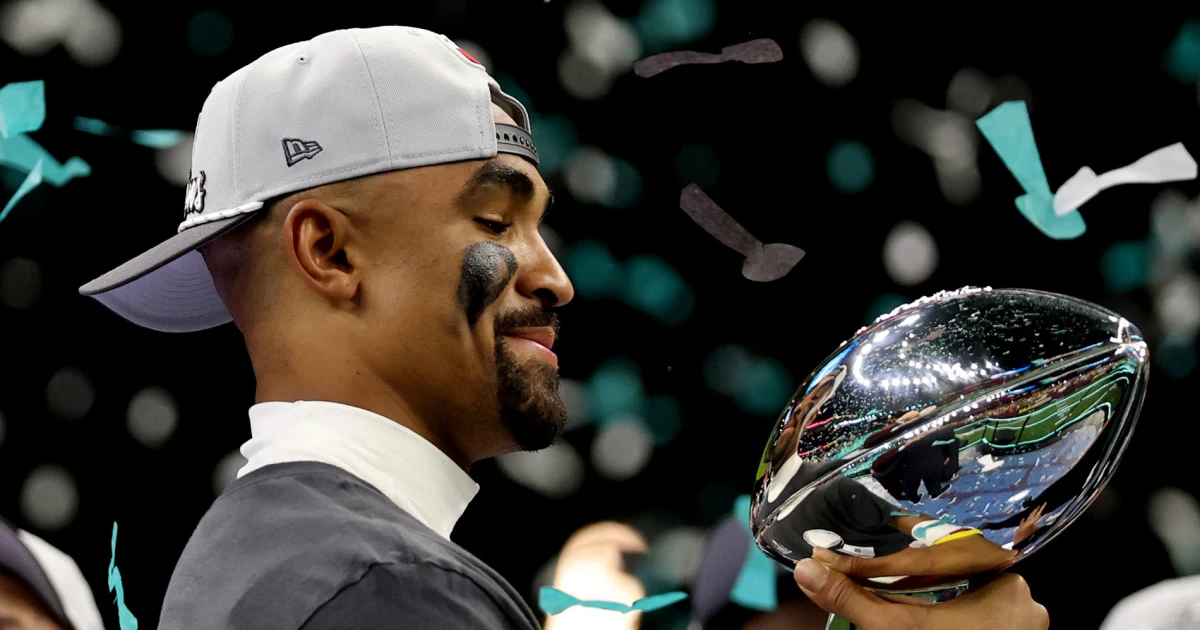The most political thing we’ve ever heard from Philadelphia Eagles quarterback Jalen Hurts are the compliments he gave former President Barack Obama after he and the former president golfed with Eagles owner Jeffrey Lurie in October. Hurts didn’t celebrate Obamacare or the Dodd-Frank Wall Street reforms Obama signed. He just uttered some platitudes, calling Obama an “uncle figure,” an “all-time leader” and “a great presence.”
After being disinvited in 2018 by Trump, the Eagles are scheduled to visit the White House on Monday.
With praise so generic, Hurts could have been speaking about any president, and that’s probably how he wanted it. Finding that equilibrium won’t be so easy Monday, when the Eagles’ players will be scrutinized for evidence of where they stand on President Donald Trump. Seven years after a previous Eagles team won the Super Bowl and was invited to the White House and then disinvited by Trump, the Eagles are scheduled to visit the White House on Monday, a tradition for Super Bowl winners since Jimmy Carter invited the Pittsburgh Steelers in 1980. Surely, not every Steeler of that era voted for Carter, and sports reporters of the day weren’t in the habit (or maybe didn’t have the courage) to ask “Mean” Joe Greene or Jack Lambert, the snaggletoothed and fearsome linebacker, if they were registered Democratic or Republican.
These are different times, when many fans want their favorite players to reflect their political views or may even pick their favorites based on their perceived political views. Such expectations will leave Eagles players in a no-win situation Monday. If they show up, it’ll be for a photo-op with a president deeply unpopular in Philly, where Trump lost by wide margins in all three of his presidential bids. If a star like Hurts skips, then Trump might unleash one of his angry social media rants.
Just watch how Hurts responds when he was asked Thursday if he would be attending the White House with the team. I used a link here rather than quote Hurts because there’s nothing to quote. Rather than speak, he looks at the interviewer for a few seconds. Thus, his answer was complete silence. But a silence that nonetheless spoke volumes.
Hurts knows people would read something into his answer no matter what his answer was, and that’s a paradigm of the president’s making. Trump knows how to benefit politically from people who stand with him and people who don’t and deftly uses athletes as political fodder, especially about racially divisive issues that appeal to his conservative base.
His earlier battles with the NBA and the NFL might have been the first iteration of that strategy. At the zenith of NFL players’ anti-police-violence protests in 2017, Trump said at a campaign rally for then-Sen. Luther Strange of Alabama that, when a player protested, NFL owners should “get that son of a bitch off the field right now.” In other words, fire any player who knelt during the national anthem. Later that year, he disinvited the NBA champion Golden State Warriors from visiting the White House. Warriors star Stephen Curry and head coach Steve Kerr had publicly criticized Trump.
In 2018, Trump turned his ire to the Eagles, that year’s Super Bowl champs. ESPN reported that as few as five Eagles players planned to attend the Eagles’ planned visit to the White House that year before Trump canceled it altogether. Leaked audio from an October 2017 meeting of NFL players and execs revealed that Lurie had called Trump’s presidency “a disaster,” The New York Times reported. Lurie has said he looks forward to this year’s visit, but player attendance is optional.
At least one star Eagles player essentially started his visit early. Running back Saquon Barkley reportedly met with Trump at his Trump National Golf Club Bedminster in New Jersey and flew back to Washington with the president aboard Marine One.
Hurts, who was drafted in 2020, wasn’t on that 2018 Super Bowl team, but the political cloud over the NFL is still there. Unlike other companies, the league hasn’t ended its diversity, equity and inclusion initiatives since Trump began targeting such programs. But it did curtail some of its progressive virtue signaling; for example, along the back end zone line, the league replaced “End Racism” with milquetoast phrases such as “Choose Love” and “It Takes All of Us.”
Not all athletes are uncomfortable with staking out political or social positions. Curry, former Eagles star Malcolm Jenkins and LeBron James leaned into the country’s roiling atmosphere around racial equity in the late 2010s and the early part of this decade, using their platforms to support efforts for police reform and to push their leagues to back players who felt the same.
The NFL Players Coalition, which grew out of that era, shares a lineage with a 1967 meeting in Cleveland at which Bill Russell, Kareem Abdul Jabbar (then Lew Alcindor), Jim Brown and others debated supporting Muhammad Ali in his stance against the Vietnam War. Any Eagles player who accepts backlash for skipping a visit to the Trump White House will be in the company of generations who previously stood on their principles and protested.
What’s different now, though, is the prospect of blowback for those who choose not to protest.
Keith Reed
